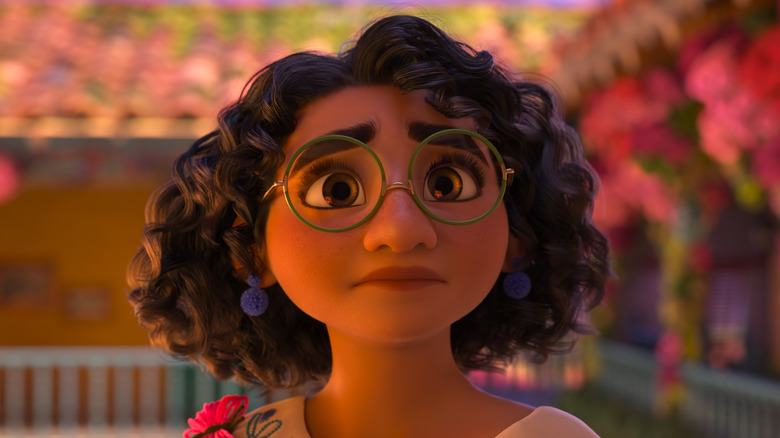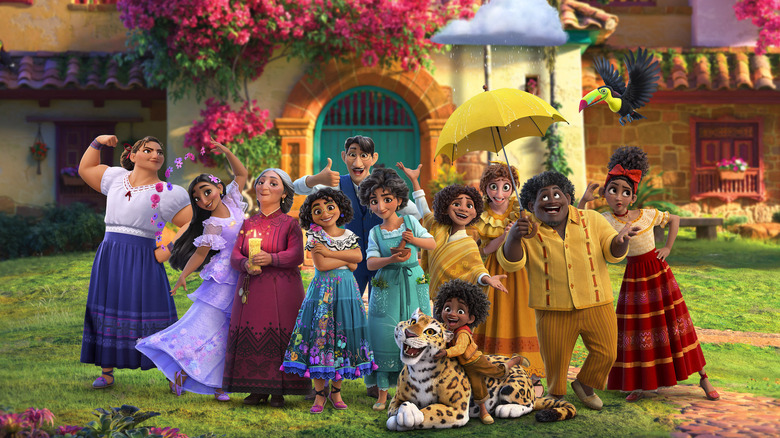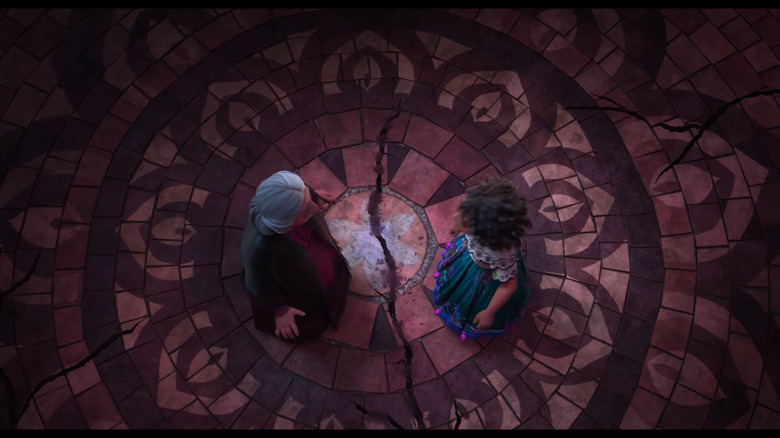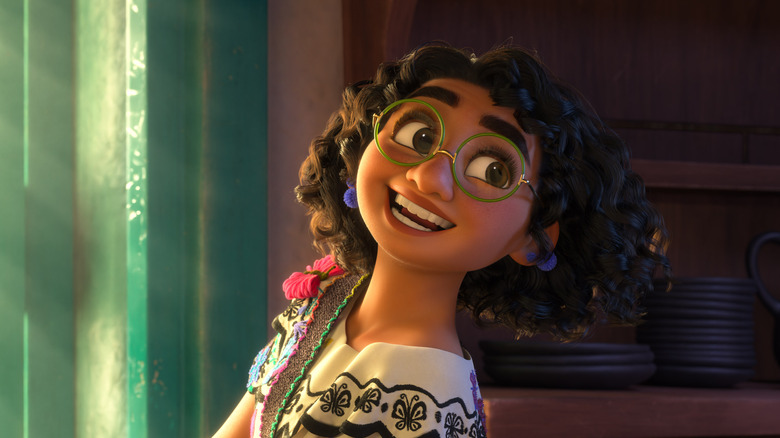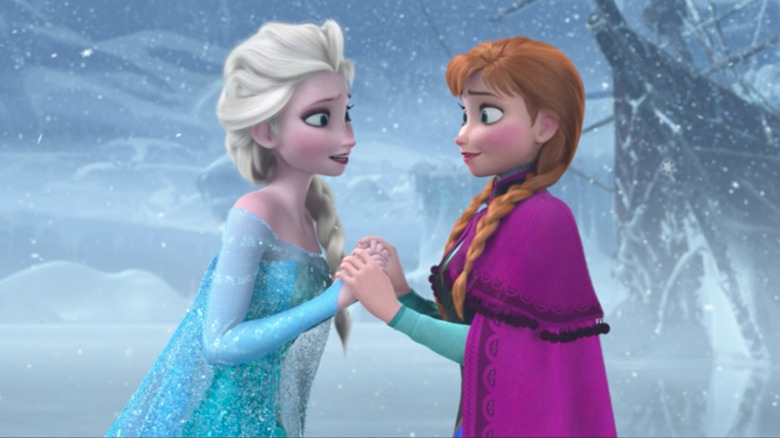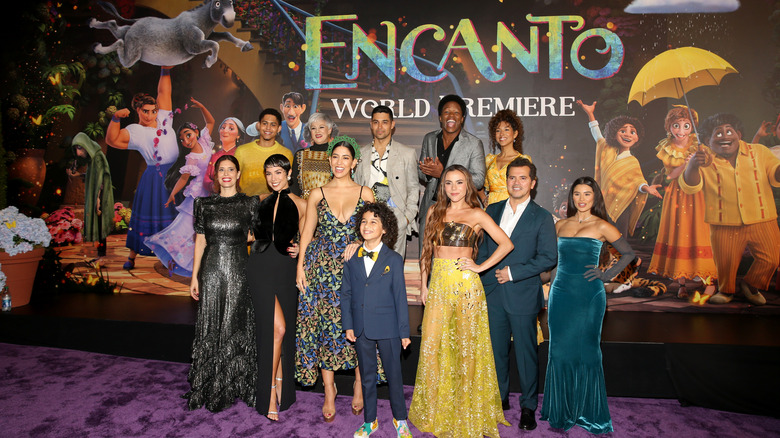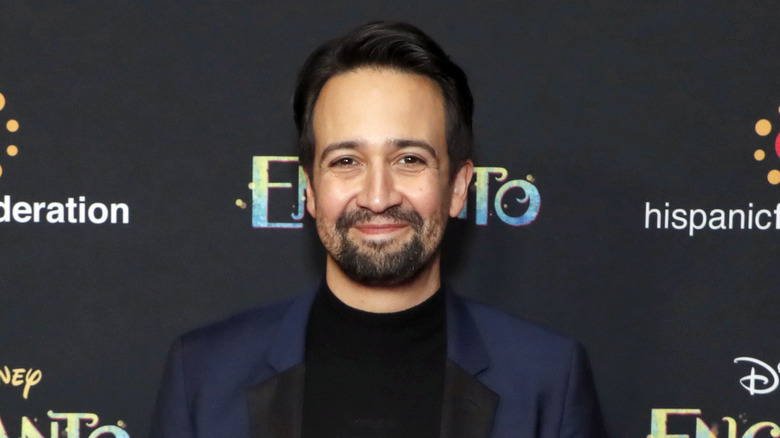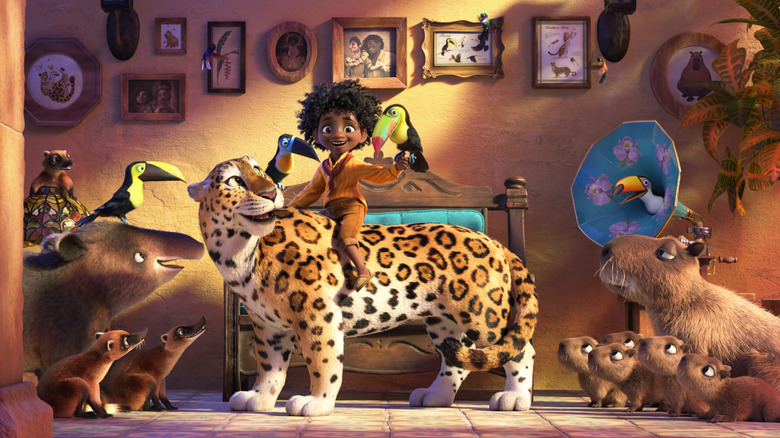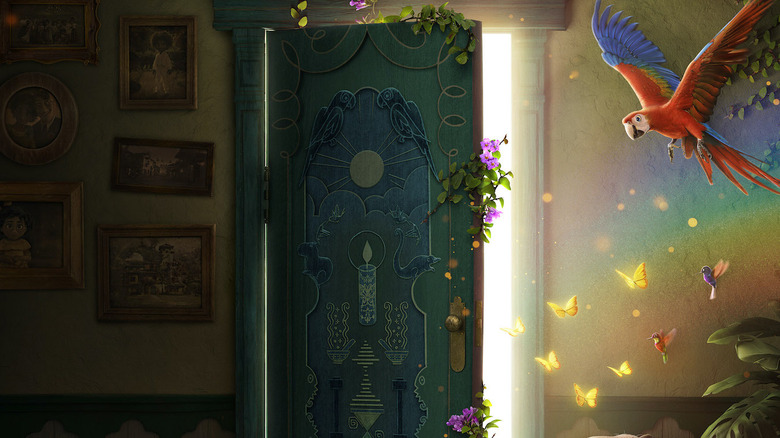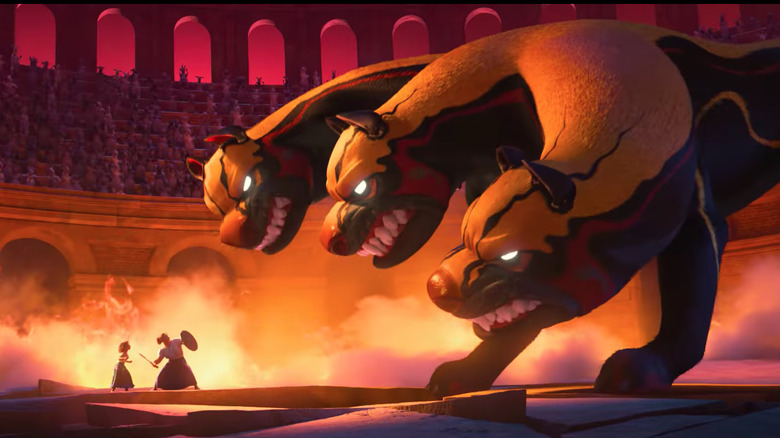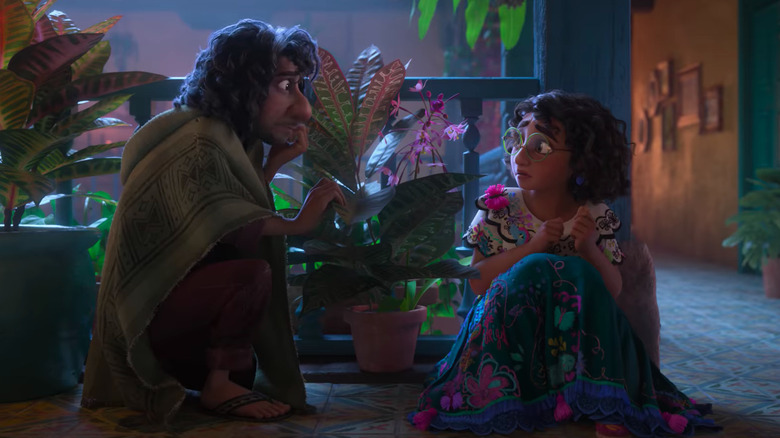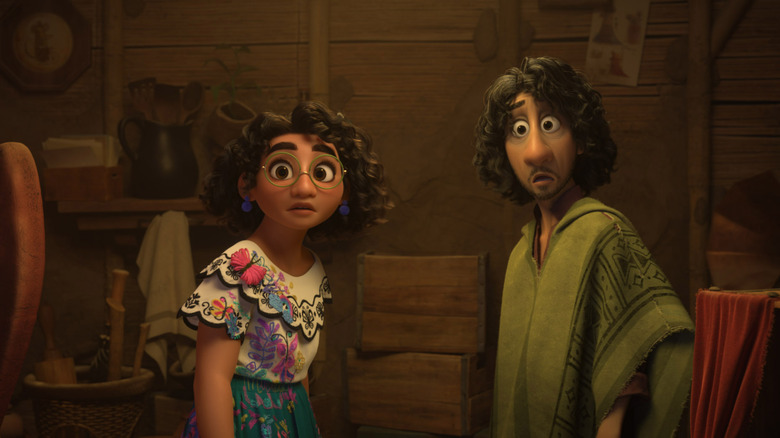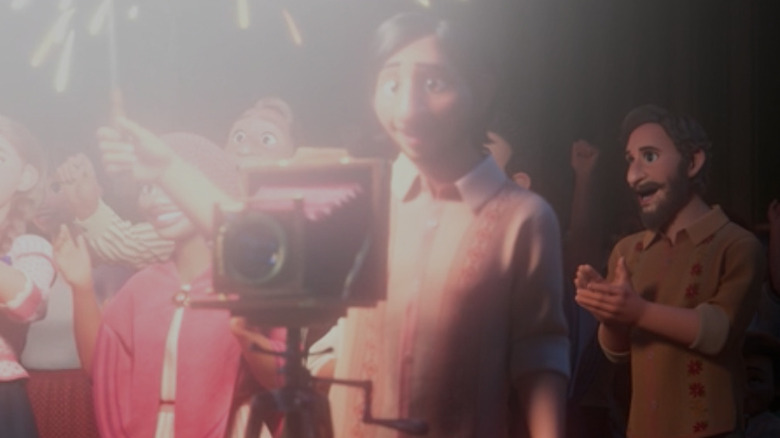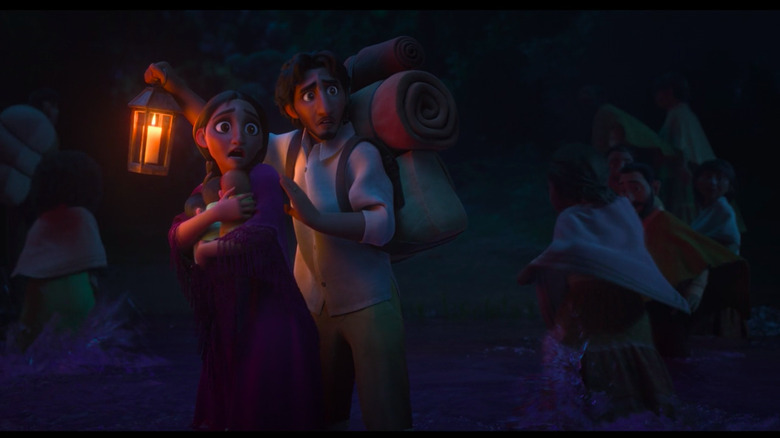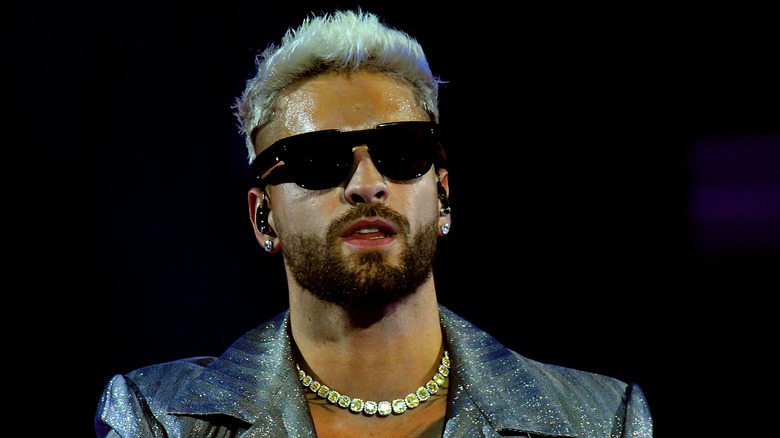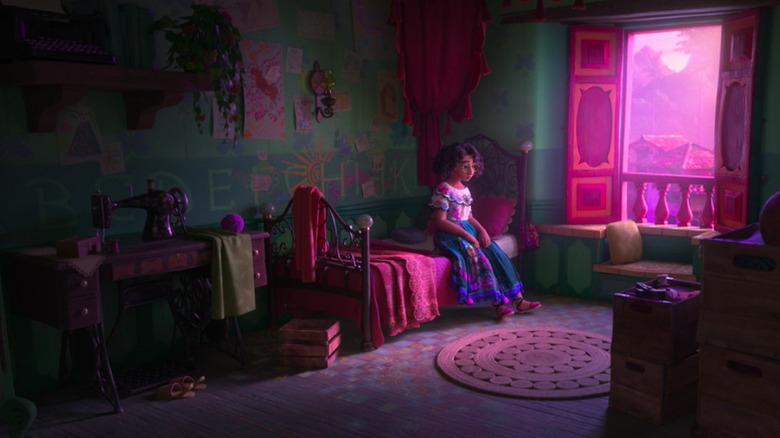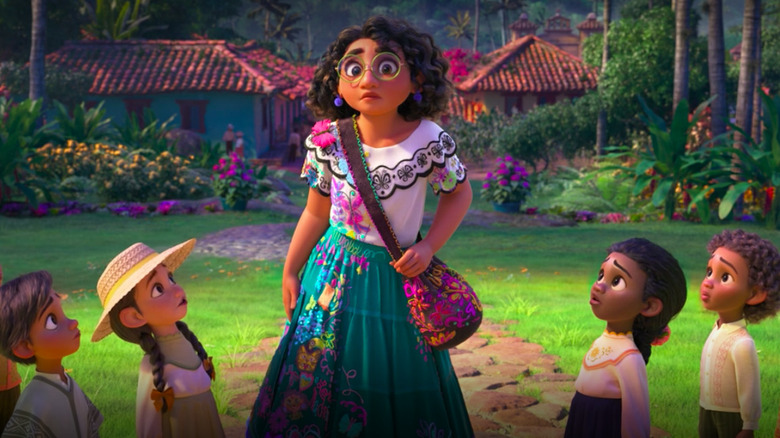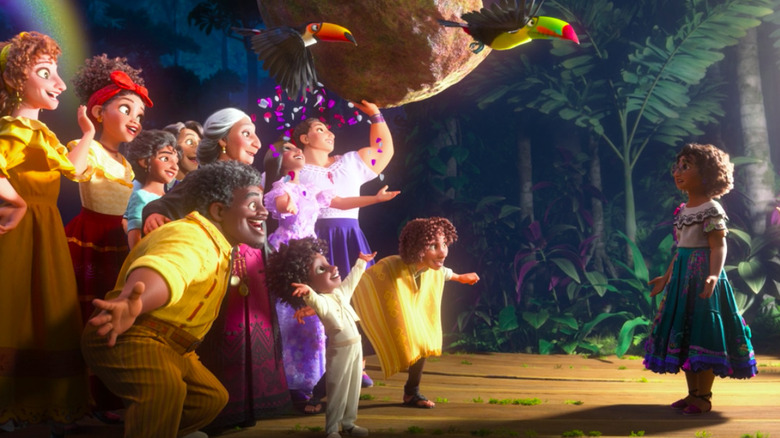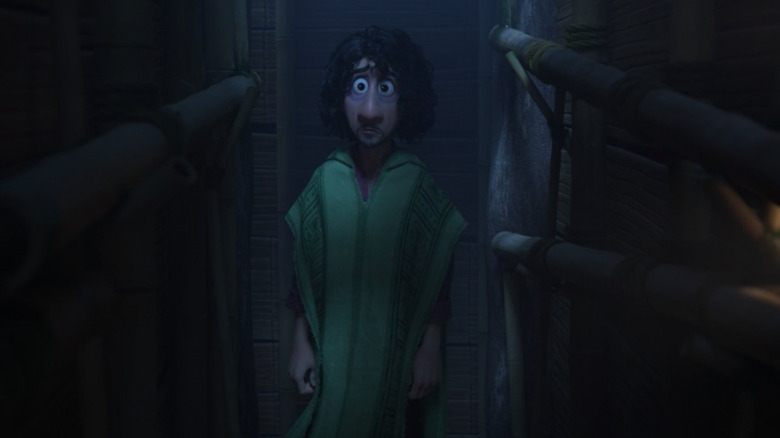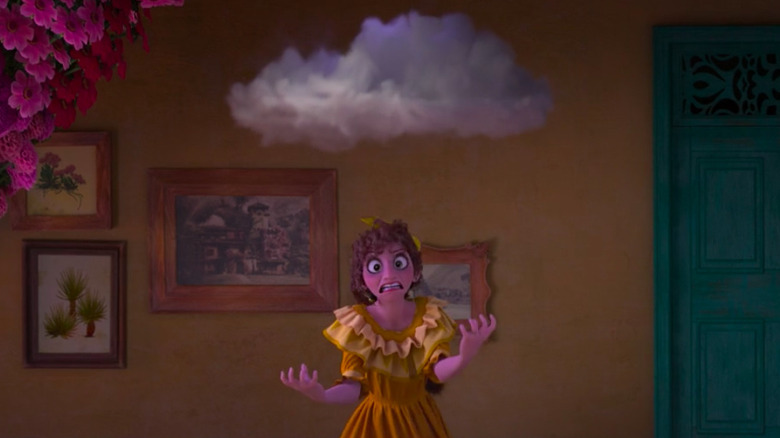Things Only Adults Noticed In Encanto
The members of the Madrigal family from Disney's "Encanto" can do amazing things. Ever since Madrigal matriarch Alma (María Cecilia Botero) was forced to flee her home, and watched her husband Pedro perish during their escape, each member of her family has been granted a magical gift that enables them to help the community of people that followed Alma to the hidden paradise in Colombia — the titular "Encanto" — where they now reside. From the ability to heal to astonishing strength to speaking to animals, each Madrigal child's gift makes them exceptional — each child except Mirabel (Stephanie Beatriz), who for some reason was denied the magic that makes the rest of her family so special. Yet when that magic starts to falter 10 years after Mirabel was relegated to being the only ordinary member of her extraordinary family, she becomes their best hope for restoring what's broken.
"Encanto" is the story of a large family that is bound together by love and service to the community, but who may be torn apart by the pressures and doubts that go with living up to their legacy. Full of lively songs, vibrant animation, and interesting characters, the heartwarming film will appeal to kids and adults alike. However, as the story unfolds, there are multiple things that are likely to go over kids' heads. Here's a look at some of the things only adults are likely to notice in "Encanto." But proceed with caution — there are major spoilers ahead!
The Madrigal family aren't royalty but they might as well be
When we think of Disney animated films, especially Disney animated films revolving around a female protagonist, princesses are typically top of mind. But kids are sure to recognize that, unlike the title characters in recent movies "Raya and the Last Dragon," "Moana," and "Frozen," Mirabel isn't a princess and the Madrigal family isn't royalty. What kids may miss is that even though they don't live in a castle or sit on thrones, the magic granted to the Madrigals gives them an exalted status in their community. So while they may not officially be considered royalty, by acting as their community's leaders and protectors, the Madrigals are the closest thing to it.
In fact, the Madrigals check many of the boxes for royal status, including a birthright to power that's passed down through the generations and an unspoken understanding that they should put the needs of the family ahead of their own personal desires. Mirabel's lack of a gift excludes her from some of these requirements, but she grapples with her own disappointments over being the only non-magical Madrigal. Ultimately, though, Mirabel's determination to help those she loves is what makes her most like Raya, Moana, and Anna and Elsa. Given all this, it wouldn't be a surprise to see Mirabel join Disney's princess lineup sometime soon, regardless of whether or not she's officially royalty.
The movie doesn't have a traditional antagonist
"Sleeping Beauty" has Maleficent, "The Little Mermaid" has Ursula, even "Frozen" has Hans. Ever since Disney's first animated feature "Snow White and the Seven Dwarfs" was released in 1937, almost all Disney animated films have had a noteworthy antagonist. Many of those antagonists have become as revered as their movie's protagonists. Yet, "Encanto" won't be adding to the Disney villain ranks.
There is no character in "Encanto" who could be considered a typical bad guy. Sure, Mirabel is often at odds with her seemingly perfect sister Isabela (Diane Guerrero) and Abuela Alma discounts and dismisses Mirabel due to her status as the only Madrigal without a gift, but these are family squabbles between people who love each other and want to get along.
The real antagonist of "Encanto" is less obvious. It's the fear that keeps the Madrigals from being honest with one another and the pressure to fulfill their familial obligations that threatens the magic powering their home. So while kids may not notice the movie lacks a traditional bad guy, many will still be able to relate to the way their role within their families may limit what parts of themselves they can show, even to the people they love the most.
A short time ago, Luisa's muscle-bound character would have been a man
Mirabel's middle sister Luisa (Jessica Darrow) was given the gift of strength, and ever since, she's used her powers to help the members of the community with all their heavy lifting. Whether it's single-handedly rounding up an escaped herd of donkeys and carrying them back to their enclosure or moving the local church to a more optimal location, Luisa is constantly busy lifting, hauling, and fixing. For children growing up now, the fact that Luisa is a woman may seem perfectly natural. After all, kids today live in a world where "Wonder Woman," "Captain Marvel," and numerous other female characters are willing and able to take on their enemies without hesitation or male assistance. So even though there's still a divide between the way men and women are treated in the movies and beyond, women are more often depicted as being every bit as strong as men.
Yet adults will be well aware that if "Encanto" had been made just a decade or two before now, Luisa's character would have been developed as a man. The idea of a woman being the community's strongest person may not even have occurred to filmmakers a few short years ago — or if it had, Luisa would have been ridiculed for her strength. Thankfully, today, not only can Luisa be a woman, her strength is taken seriously and accepted as the gift it is.
Mirabel is one of the only main characters with glasses in a Disney animated movie
Countless people wear glasses, just ... not in movies, and that's particularly true when it comes to Disney's animated movies. While glasses-wearing kids will appreciate seeing Mirabel sport eyewear onscreen in "Encanto," what they may not know is just how rare it is to see a main character with glasses leading a Disney film.
Not to say that characters with glasses haven't been part of the company's features since the beginning. After all, Doc, the lead dwarf in "Snow White and the Seven Dwarfs," wears glasses, as does Geppetto in "Pinocchio," Milo Thatch in "Atlantis: The Lost Empire," Carl Fredricksen in "Up," and Sadness in "Inside Out," among others. Nonetheless, Mirabel is one of the only main characters with glasses in the Disney canon.
That Mirabel is a young woman makes her glasses-wearing even more unique. In fact, if she were to join the Disney princess lineup, she'd be the only one with glasses. So while Mirabel's glasses are unusual for a movie character like her, they're also part of what makes her special in a family full of special people.
The story is reminiscent of Frozen at several points
"Frozen" is one of the most successful Disney animated films in recent memory, and between the winning performances, touching story, and memorable songs, it's become a cultural touchstone. Consequently, adults may find themselves automatically comparing the Disney movies that have come after "Frozen" to the earlier film, especially "Encanto," which has multiple moments with obvious parallels to "Frozen," even if we don't include a direct reference to its beloved anthem "Let It Go."
First, when Mirabel attempts to patch things up with Isabela in an effort to save the family's magic, she makes her sister so angry that Isabela loses her tight grip on her flower-generating powers and creates a prickly cactus. Isabela is so excited by the realization that she can use her gift in less-than-perfect ways that she sings "What Else Can I Do?" one of the movie's most inspiring songs, and for all intents and purposes, its own version of "Let It Go."
Later, when Abuela Alma finds Mirabel after the Madrigal home collapses, the pair have a revealing conversation that enables Abuela to finally admit that she needs to loosen her grip on her family so all of their lives can improve. The way the moment plays out, including Abuela finding Mirabel and their reconciliation by a body of water, is reminiscent of the climax of "Frozen" where Elsa realizes love is the answer to all of her problems.
There are some well-known voice actors behind the characters
Disney tends to have at least one or two well-known actors voicing the characters in their films, yet the voices in "Encanto" may be less obvious to many viewers, especially children. That's because many of the most well-known people behind the voices were either at the height of their fame before they were born or used a very different vocal style for their most notable character.
Falling into the former category are Wilmer Valderrama and John Leguizamo. While both of these actors are still well-known, they each appeared in their most famous roles in the 1990s and 2000s. It was during this time that Valderrama starred as Fez in the sitcom "That '70s Show" and Leguizamo appeared in movies like "Romeo + Juliet," "Spawn," and "Moulin Rouge!" As a result, while kids may not recognize their names, to their parents, these actors are likely to spark at least a few fond memories.
On the other hand, the actor whose name adults may recognize but whose voice they may not is that of Stephanie Beatriz, who plays main character Mirabel. Beatriz starred as Rosa Diaz on all eight seasons of the popular comedy "Brooklyn Nine-Nine," but to play the tough police officer, she lowered her voice substantially. As a result, both adults and kids who are fans of the show may be surprised to discover that Mirabel has a much higher and sweeter voice than gruff Rosa.
The songs are written by a famous songwriter
Perhaps the most famous name associated with "Encanto" is that of someone whose voice is never heard onscreen: Lin-Manuel Miranda, who not only composed the movie's songs but helped develop its story. Adults will recognize Miranda as the creator of the Broadway hit "Hamilton," and while some lucky kids may have seen the musical in person or caught the recorded version on Disney+, they may not know they've already heard Miranda's work in another Disney animated film, "Moana."
Yet, while "Moana" included showstoppers like "How Far I'll Go" that uphold the Disney film tradition of accessible, moving songs, adults will notice Miranda uses the opportunity provided by "Encanto" to take things in a different direction with several of its tunes. In particular, Miranda employs a style more like the one he used in "Hamilton" in numbers like "The Family Madrigal" and "We Don't Talk About Bruno," which include fast, rhythmic lyrics that unpack a lot of information in a short amount of time as well as overlapping melodies that blend and harmonize. This approach makes the songs in "Encanto" a bit more theatrical and less cinematic, but Miranda's evocative lyrics and catchy song structure ensure the soundtrack adds joy and color to the film.
The animals Antonio attracts are native to Colombia
"Encanto" reveals that the Madrigal family has a ritual for receiving their magical gifts. On the fifth birthday of each Madrigal child, the whole town gathers in the family's courtyard to watch as the child approaches a door that has been newly created by the house for them. The child recites some words in front of the candle that's the source of the Madrigal magic and then is imbued with a gift that soon reveals itself. They then open their door, unveiling a new personalized room just for them that's based on the gift they received. This is demonstrated in the movie when Mirabel's cousin Antonio (Ravi Cabot-Conyers) is granted his gift: the ability to talk to animals.
Immediately after Antonio receives his gift, he's approached by a toucan who asks Antonio a question that only he can understand. When Antonio agrees to the toucan's proposal, a gang of animals large and small enter the house and run into Antonio's new room, which is a magical animal paradise. However, the animals that populate Antonio's room and now accompany him everywhere aren't just any animals — they're animals that are native to Colombia. In addition to the toucans, they include raccoon-like coati, capybaras, the world's largest rodents, macaws, tapirs, and a jaguar. In fact, the production even made sure the tapirs are specifically mountain tapirs to match the mountainous terrain of the area the Madrigals call home.
There's a quick Dr. Who reference
After Antonio is granted his magical gift and the door to his room opens for the first time, there's a quick reference to the British sci-fi series "Doctor Who" that will go over the heads of many young children but will warm the hearts of adult "Who" fans everywhere. On "Doctor Who," the title character embarks on timey-wimey adventures in a space-and-time-ship called the TARDIS that looks like a small English police box but is substantially bigger on the inside. It's a running gag that whenever someone new enters the TARDIS they gasp, "It's bigger on the inside."
In "Encanto," one of the children in attendance at Antonio's gift ceremony says just that when she sees the interior of his room. It's a knowing wink to "Doctor Who" fans by the filmmakers, although interestingly it's also a bit of an imperfect fit for the moment. Although Antonio's room is undeniably enormous and the idea that it's bigger on the inside nods to the strange magic of the Madrigals' house, unlike the Doctor's police box, Antonio's door doesn't give a precise indication of just how big the room it leads to will be. Nonetheless, it's a funny fleeting moment that allows two pop culture behemoths, Disney and "Doctor Who," to come together.
Luisa's song includes references to Greek mythology
As the family member imbued with physical strength, Luisa is perhaps the most put-upon Madrigal. While she never complains, her services seem to be in constant demand by the people who live in the Encanto. And when Mirabel realizes the constant work may be getting to her sister, Luisa admits to the stress she's feeling in the song "Surface/Pressure." In the course of the song she references things that are likely to go over kids' heads. Not only does she compare herself to a ship trying to avoid an iceberg, a clear reference to the sinking of the Titanic, there are also two references to Greek mythology.
First, Luisa wonders if Hercules ever felt the same weight of expectation she feels when he went up against Cerberus, the three-headed dog that guards the Underworld in Greek mythology. As she sings, the image shows Luisa taking on Cerberus herself. What she is referring to, however, is the twelfth labor of Hercules in which the demigod fought and subdued the mighty beast. In addition, during the song, there's an image of Luisa holding up the globe, a reference to the Titan Atlas who, after failing to win a war against the Olympian gods, was condemned to hold up the heavens for eternity.
Bruno's actions show he's wildly superstitious
If there's one thing "Encanto" makes abundantly clear, it's that the Madrigals don't talk about Bruno, Mirabel's uncle who supposedly left the family. However, in the course of the film, Mirabel discovers that Bruno hasn't gone as far as everyone thought.
For years he's secretly been living between the walls of the Madrigals' house with only rats to talk to. Needless to say his circumstances have made him a little eccentric, and part of that eccentricity is shown in the actions he takes to ward off bad luck. When Mirabel first encounters Bruno, he knocks on the wood all around him, a familiar gesture to bring good luck that even kids will probably recognize.
However, Bruno quickly follows that up by tossing a pinch of salt over his left shoulder, a gesture he repeats later in the story after agreeing to use his gift to help Mirabel see her future. And while kids may have seen this done before, they may not realize what adults likely will: that throwing salt over one's shoulder is an obscure bid to drive away bad luck. Bruno's reliance on these superstitious gestures speaks to just how nervous and paranoid he's become during his isolation from his family.
Encanto is the rare film that points to the dark side of clairvoyance
The Madrigals are celebrated in "Encanto" for their magical gifts, but not every Madrigal benefits equally from the gift they're given. Bruno's gift — the ability to see visions of the future — seems like more of a curse. Many fictional characters have been given the power to see the future, and their foresight is often celebrated in their stories as a force for good that can be used to help people correct the course of humanity.
Bruno isn't so lucky. When he first got his powers, informing people about what the future held for them tended to turn them against him, especially if it was bad news. As Bruno's warnings came true, the townspeople soon came to the conclusion that Bruno wasn't simply telling them what he was seeing but was actually causing it to happen. Even Bruno's sisters seemed to share this presumption, so when he saw a vision that indicated the Madrigals' magic would someday be extinguished, Bruno left to avoid being accused of potentially bringing down his own family. The negative response to Bruno and his so-called gift speaks to the dark side of a power that is painted with a positive light in many stories.
The movie heavily references the history, culture, and design of Colombia
While the story told in "Encanto" is universal, the filmmakers have also included many elements that are specific to Colombia, the country where it takes place. One of the most obvious ways they achieve this is through the use of yellow butterflies, a motif that's repeated throughout the movie and is a reference to the work of revered Colombian writer Gabriel García Márquez. In particular, yellow butterflies appear in Márquez's beloved novel "One Hundred Years of Solitude," where they symbolize love and conflict and the way the two can come together, a theme that's important to "Encanto" as well.
The filmmakers also took care to ensure the architecture, costumes, landscape, dance, and music incorporated into the film are accurate to Colombia. This can be seen in the traditional costumes worn by the characters and the texture of the materials that were created to design the Madrigals' house. Moreover, songwriter Lin-Manuel Miranda said he immersed himself in the music of Columbia so he could create songs that felt authentic to the setting. He did this by, for example, incorporating the accordion into the film's opening number because of the instrument's importance to Colombian music. In fact, the accordion is so essential to the music of Colombia, Mirabel is seen playing it during the song.
It's unclear when the movie takes place
As with many Disney releases, the "Encanto" filmmakers are vague about exactly when the story takes place. Due to the lack of modern technology, kids will be aware that the film is set sometime before now. However, adults are likely to notice that, despite the lack of specifics, the movie contains clues that point to its time period. The most obvious hints are the gadgets seen throughout the story. Toward the beginning of the film, Mirabel grabs her skirt from a vintage sewing machine and a bit later a man uses a folding camera to take a photo of the Madrigals following Antonio's gift ceremony. Both of these items can be dated to around the 1950s.
"Encanto" also makes brief but important nods to history that help narrow down the movie's time period. When Abuela Alma discusses how the Madrigals came to possess the magical candle that's the source of their power, the tale is intimately tied to a time when she and her husband were forced to flee their village. While the movie never mentions the event that caused them to leave their home, the details suggest it was the Thousand Days' War, a civil war in Colombia waged between 1899 and 1902. And since the Madrigals' candle is around 50 years old by the time the main plotline unfolds, this is further evidence the story is set at some point in the 1950s.
The movie speaks to the trauma of being displaced from home
While the Madrigals love each other and their community, underneath their positive exterior lies a great deal of anxiety and concern about living up to the expectations of others, especially their Abuela Alma. While kids will understand that the Madrigals have their issues, only adults are likely to recognize that Abuela Alma is suffering from her own specific challenges. When we meet her, she's spent more time in the idyllic Encanto than she did in her original home. However, she didn't leave her village by choice, but was forced to flee in a bid to save her and her family's lives from the violence there, an event that led to her husband Pedro's death. The trauma of the experience caused Abuela to become reliant on the magic that has protected and provided for her and her family since.
Abuela Alma's struggles are representative of the trauma of all people who are forcibly displaced from their homes. Refugees and immigrants often have no other choice but to leave, however, the experience is understandably destabilizing and extremely stressful. But the movie also portrays the intergenerational trauma caused by such an experience, as characters like Mirabel, Luisa, Isabela, and Bruno speak to the pressures they feel, which have been instilled in them by Abuela's focus on each of their gifts — or lack of a gift, in Mirabel's case.
The cast includes a major Colombian pop star
Even if they're fans of Latin music, kids might not realize that the voice of "Encanto" village hunk Mariano, who's poised to propose to Isabela, also croons some of their favorite tunes. However, adults are likely to figure out that Mariano is voiced by Latin music superstar Maluma.
While he was born in Medellín, Colombia, the singer-songwriter has since gained global fame, performed around the world, and earned awards recognition from the Latin Grammys, the Billboard Music Awards, and the MTV VMAs. Despite his musical bona fides, however, Maluma doesn't sing all that much in "Encanto." He joins in on the group song "All of You" toward the end of the film, but doesn't have his own solo number. Instead, he focuses on voice acting, believably bringing his dashing character to life in both the English and Spanish language versions of the film.
Given his Colombian roots, "Encanto" is understandably a project that's close to Maluma's heart. In a statement after his casting was announced, the singer said, "'Encanto' is such a magical movie. I'm from Colombia and the story is about a Colombian family. I'm proud to be part of this beautiful story. It means so much to me as I'm very passionate about sharing my country's cultural values and story globally." Maluma has continued building his acting career with a role in the Jennifer Lopez vehicle "Marry Me."
Even without a gift, Mirabel could've moved out of the nursery
The Madrigal house grants each child a personalized room to go with the magical gift they received at five years old. Both children and adults will understand that the house didn't provide Mirabel with her own room because she didn't get a gift — but she also never moved out of the nursery where all the Madrigal children stay for the five years of their lives. That means for the past 10 years, Mirabel has been living in a room that's meant for children far younger than she is. This can be seen by the letters of the alphabet ringing the room and the childish drawings etched on the walls and floors. Plus, when other children are born into the family, like Mirabel's cousin Antonio, she must share the nursery with them — and likely take on some of the childcare duties as a result.
This may cause adults to wonder why, despite Mirabel's lack of a gift-specific room, the Madrigals didn't repurpose another space for her that she could have decorated in a more age-appropriate way. Or she could have stayed in the nursery but updated the room as she grew up so it became a better reflection of her. Instead, Mirabel has only managed to add a few personalized touches to the space, ensuring it's forever dedicated to new Madrigal children instead.
It's odd that the kids in town don't know Mirabel didn't get a gift
Everyone in the Madrigals' village knows them as the magically gifted family that keeps life there humming along. Yet, with such a big family, it makes sense that the village children might not know or remember each individual family member or their particular gift. As a result, viewers won't be too surprised when Mirabel breaks into her first song, "The Family Madrigal," to fill the kids in on all her relatives — although adults will be aware that the song is giving the audience all the information they need on the film's central family too.
So when the kids ask Mirabel about her gift, adults will understand this is more for the audience's benefit than for the onscreen children's. However, some may also wonder why those children don't know — it's common knowledge in her village, and Mirabel's lack of a gift makes her a standout in her family. Plus, the village kids call to Mirabel specifically to answer their questions about her family but act as though the other Madrigals are celebrities, indicating they're more comfortable with Mirabel than her relatives. As a result, it seems likely that in the world of the story, Mirabel and her lack of a gift would actually be the one Madrigal family fact the village kids would easily recall.
Most of Mirabel's actions and attitudes are coping mechanisms
Early in "Encanto," Mirabel proclaims, "Gift or no gift, I am just as special as the rest of my family." In response, one of the village boys speculates her gift could be "being in denial." Kids will understand this as the humorous observation it's meant to be, but adults will notice it's also pretty perceptive. That's because almost everything Mirabel does or says in the film is intended to hide her real feelings about her position in her family. When we first meet her, Mirabel seems like a ball of energetic joy as she talks up her magical clan. Yet it soon becomes clear that Mirabel's sunny exterior is a mask for the sadness and loss she feels because she wasn't granted the gift she was promised.
Mirabel is shown doing her best to compensate by helping her family in any way she can. She understandably feels she doesn't fit in without a gift of her own, and since the other Madrigals help the community with their special powers, Mirabel does whatever she can to help too in a bid to seem more like the rest of her family. The problem is, as Isabela observes, Mirabel is trying too hard. Without a gift, Mirabel doesn't know how to define herself, so she overcompensates with a cheerful attitude and a determination to help that distract her from her feelings of grief and alienation.
It's improbable that Bruno went undetected for 10 years
In the 10 years since he disappeared, Bruno has become known as the Madrigal who lost his way and vanished without a trace. Yet the truth is Bruno simply hid within the walls of the Madrigals' house — a revelation the movie treats as a big surprise. However, many adults will be left wondering how Bruno could have gone undetected in the house for so long.
Even in hiding, Bruno would have had to regularly come out from behind the walls for food, water, and other provisions, and given the number of people who live in the house, it seems at least one of them should have spotted him sneaking around over the course of a decade. If that weren't enough, Dolores (Adassa) admits more than once that she detected him with her super-hearing. And the movie establishes that Dolores is terrible at keeping secrets, as she quickly shares Mirabel's discovery of the remnants of Bruno's vision within minutes of finding out about them. If she couldn't keep quiet about that, what are the chances she didn't mention Bruno's status for years?
Of course, it's possible that many of the Madrigals knew that Bruno was still living in the house, but given Bruno was persona non grata to the family, they didn't want to say anything for fear that the other family members would blame the messenger. After all, the Madrigals refuse to talk about Bruno for a reason.
Mirabel's Aunt Pepa has some serious anxiety issues
Each member of the Madrigal family is given a gift that reflects their personality and can be used to help the community. Yet not all of the Madrigals' gifts are equally useful. Many adults will notice this seems to be especially true of Mirabel's Aunt Pepa (Carolina Gaitan), who has been given the miraculous power to control the weather.
While this would normally be an incredible gift, Pepa isn't like Storm from "X-Men" who can summon rain and wind at will. Instead, she's a bundle of emotions whose mood is reflected in the weather she conjures. As a result, throughout "Encanto," Pepa is seen with clouds hovering above her head signifying the anxiety she seems to feel almost constantly. Whether she can't find Antonio ahead of his gift ceremony or Bruno tells her it may rain on her wedding day, Pepa reacts as if the world is falling apart. In fact, it's that anxiety that led to her getting married in a hurricane, as it was her negative emotions that created the tempest.
Pepa's gift is well suited to her stressed out personality, given how deep her emotions seem to run. However, in the time since she received her gift, it appears Pepa hasn't managed to harness her feelings in a way that enables her to turn her gift to her own or the community's advantage.
